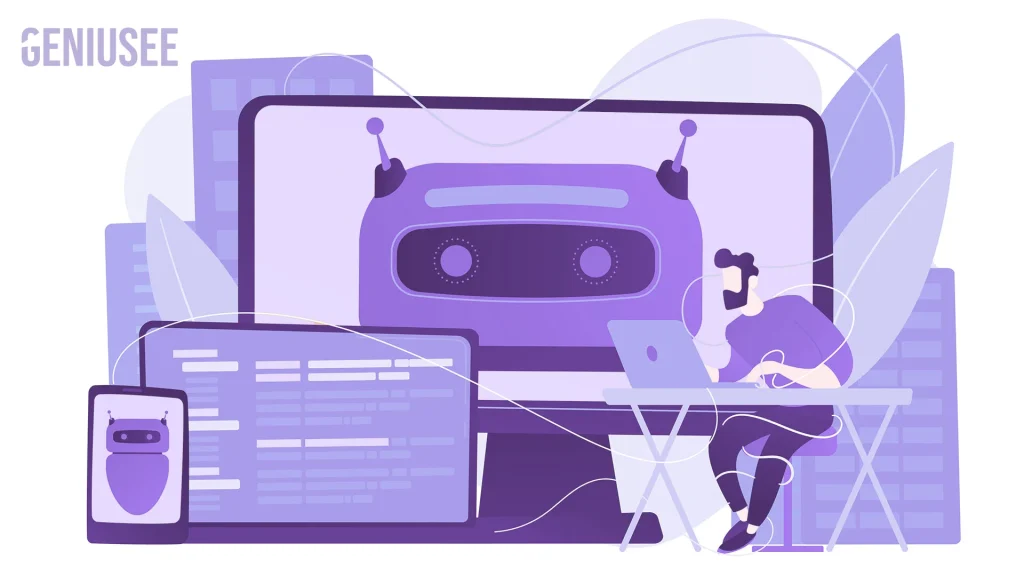In today’s rapidly advancing technological landscape, partnering with a generative AI development services company can be a game-changer for businesses seeking innovative solutions. Generative AI leverages advanced algorithms and neural networks to create new content that mimics existing data, whether it’s text, images, music, or video. This technology is transforming various industries, enabling businesses to produce high-quality content, automate complex tasks, and drive innovation.
Geniusee, a leading software development company, exemplifies how generative AI can be harnessed to deliver cutting-edge solutions. With a focus on innovation and excellence, they integrate state-of-the-art AI technologies into their development services, helping businesses streamline operations, enhance customer experiences, and achieve their strategic goals.
Understanding Generative AI
Generat AI is a branch of artificial intelligence that emphasizes creating new content based on patterns and structures found in existing data. This is typically achieved through models like Generative Adversarial Networks (GANs) and Variational Autoencoders (VAEs). GANs are made up of two rival neural networks—a generator and a discriminator—that collaborate to produce realistic data. The generator creates new data, while the discriminator evaluates its authenticity, leading to continuous improvement. VAEs, on the other hand, encode input data into a compressed representation and then decode it to generate similar data.
Key Applications of Generative AI
Generative AI’s versatility allows it to be applied across various domains, driving significant advancements and efficiencies.
1. Healthcare
In healthcare, generative AI can generate synthetic medical images, including X-rays and MRI scans, to enhance training datasets and boost diagnostic precision. It also aid in drug discovery by producing new molecular structures with desired properties, accelerating the development of novel medications. Additionally, generative AI can create synthetic patient data for research, preserving privacy while providing realistic datasets for training and testing algorithms.
2. Finance and Trading
Generative AI can simulate financial market conditions, generating synthetic data for backtesting trading strategies and conducting risk analysis. It also helps in fraud detection by generating synthetic fraudulent transaction data, which enhances the training of robust detection systems. Furthermore, generative AI supports portfolio optimization by creating synthetic market scenarios, enabling better risk assessment and investment decisions.
3. Content Creation
Generative AI is revolutionizing content creation in fields like art, design, and entertainment. It can produce unique artwork, designs, and virtual characters for video games, virtual reality experiences, and animations. In music, generative AI can compose original pieces in various genres and styles, providing new sources of inspiration for composers and musicians. Moreover, it can generate human-like text for stories, articles, and product descriptions, significantly aiding content creators.
4. Natural Language Processing (NLP)
In NLP, generative AI powers chatbots and virtual assistants, allowing them to engage in natural and coherent dialogues with users. It also improves language translation systems by generating more accurate and fluent translations. Generative AI models can automate text generation, assisting in content creation and enhancing customer interactions.
Benefits of Generative AI
Generative AI offers numerous advantages that make it a valuable asset for businesses.
1. Automated Content Production
Generative AI enables the automated creation of large volumes of content with minimal human intervention. This streamlines content production processes, reducing costs and increasing productivity.
2. Enhanced Customer Experience
By leveraging generative AI, businesses can deliver personalized and tailored experiences to customers. AI-generated recommendations, product suggestions, and user interfaces enhance customer satisfaction and engagement.
3. Cost and Time Efficiency
Generative AI reduces the time and costs associated with various tasks, such as marketing material creation, product design, and data entry. This enables businesses to accelerate progress production cyclesand allocate resources more effectively.
4. Task Automation
Generative AI automates repetitive tasks, allowing human resources to concentrate on more strategic and complex tasks. This leads to improved efficiency and productivity.
5. Data Analysis
Generative AI can analyze large datasets to uncover valuable insights, helping businesses understand customer behavior, market trends, and potential opportunities. These insights inform strategic decision-making and drive business growth.
Challenges of Generative AI
Although generative AI provides numerous advantages, it also comes with several challenges.
1. Quality Control
Ensuring the generation of high-quality content consistently is challenging, as models may produce unrealistic or incoherent outputs.
2. Data Limitations
Generative AI depends significantly on the quality and variety of its training data. Insufficient or biased datasets can lead to imprecise or biased results.
3. Training Complexity
Training generative models is computationally intensive and time-consuming, requiring powerful hardware and extensive resources.
4. Evaluation Metrics
Assessing the quality of generated content is complex, as traditional metrics may not be suitable. Developing appropriate evaluation metrics is an ongoing research area.
5. Ethical Considerations
Generative AI brings up ethical concerns, including the creation of deepfakes and fake news. Responsible development practices and regulations are necessary to mitigate these risks.
Best Practices for Building Generative AI Solutions
Creating effective generative AI solutions requires adhering to several best practices:
1. Define Clear Objectives
Establish specific goals for your generative AI project. Clear objectives guide the development process and ensure the final solution meets business needs.
2. Use High-Quality Data
Collect and preprocess high-quality, relevant data to train your models. Clean data enhances the performance and reliability of generative AI solutions.
3. Choose the Right Algorithms
Select algorithms that best fit your specific application. Try various models to find the most effective one for your needs.
4. Develop a Scalable Architecture
Develop a strong and scalable infrastructure to accommodate increasing data and user demands. Incorporate distributed computing and load balancing to maintain performance.
5. Optimize for Efficiency
Implement techniques like caching, data partitioning, and asynchronous enhancing speed and efficiency through processing of your solution.
6. Monitor and Maintain
Consistently track the performance of your generative AI solution to identify and resolve issues promptly. Continuous monitoring ensures sustained effectiveness and reliability.
7. Ensure Security and Privacy
Ensure strong security measures to safeguard user data. Use encryption, access controls, and data anonymization to safeguard sensitive information.
8. Thorough Testing
Conduct exhaustive testing in various scenarios to ensure the solution performs well under different conditions. Address any identified issues before deployment.
9. Documentation
Keep detailed records of the development process, covering data sources, methodologies, and model configurations. Documentation aids transparency and future maintenance.
10. Continuous Improvement
Regularly update and refine your generative AI solution based on user feedback and performance metrics. Continuous improvement ensures the solution remains relevant and effective.
Conclusion
Generative AI is a revolutionary technology with vast potential. to revolutionize various industries. Companies like Geniusee are at the forefront of this innovation, offering generative AI development services that drive efficiency, creativity, and strategic growth. By embracing generative AI, businesses can discover new opportunities, optimize operations, and provide outstanding value to their customers. If your organization is ready to explore the transformative potential of generative AI, partnering with a seasoned development company can guide you through the complexities of AI integration. and achieve your business objectives with confidence.






